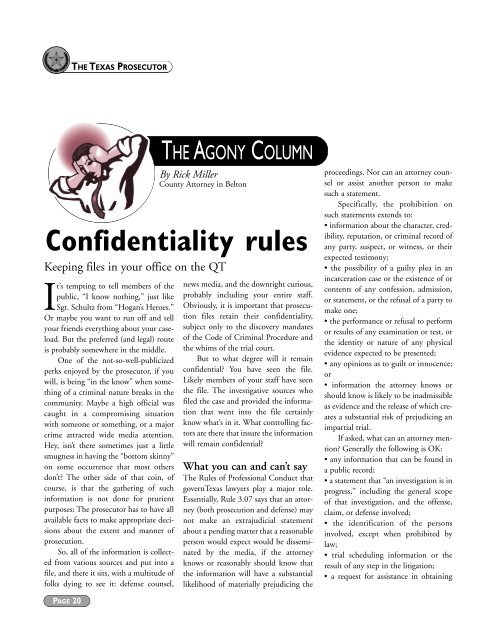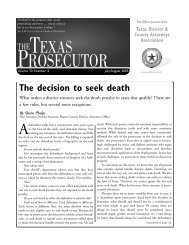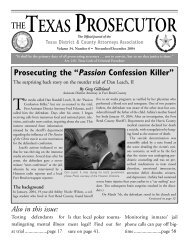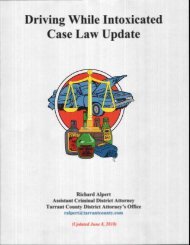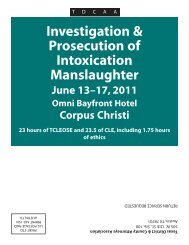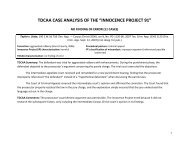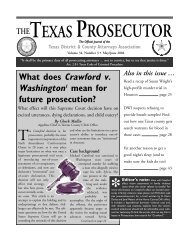Texas District & County Attorneys Association
Texas District & County Attorneys Association
Texas District & County Attorneys Association
Create successful ePaper yourself
Turn your PDF publications into a flip-book with our unique Google optimized e-Paper software.
THE TEXAS PROSECUTORTHE AGONY COLUMNBy Rick Miller<strong>County</strong> Attorney in BeltonConfidentiality rulesKeeping files in your office on the QTIt’s tempting to tell members of thepublic, “I know nothing,” just likeSgt. Schultz from “Hogan’s Heroes.”Or maybe you want to run off and tellyour friends everything about your caseload.But the preferred (and legal) routeis probably somewhere in the middle.One of the not-so-well-publicizedperks enjoyed by the prosecutor, if youwill, is being “in the know” when somethingof a criminal nature breaks in thecommunity. Maybe a high official wascaught in a compromising situationwith someone or something, or a majorcrime attracted wide media attention.Hey, isn’t there sometimes just a littlesmugness in having the “bottom skinny”on some occurrence that most othersdon’t? The other side of that coin, ofcourse, is that the gathering of suchinformation is not done for prurientpurposes: The prosecutor has to have allavailable facts to make appropriate decisionsabout the extent and manner ofprosecution.So, all of the information is collectedfrom various sources and put into afile, and there it sits, with a multitude offolks dying to see it: defense counsel,news media, and the downright curious,probably including your entire staff.Obviously, it is important that prosecutionfiles retain their confidentiality,subject only to the discovery mandatesof the Code of Criminal Procedure andthe whims of the trial court.But to what degree will it remainconfidential? You have seen the file.Likely members of your staff have seenthe file. The investigative sources whofiled the case and provided the informationthat went into the file certainlyknow what’s in it. What controlling factorsare there that insure the informationwill remain confidential?What you can and can’t sayThe Rules of Professional Conduct thatgovern<strong>Texas</strong> lawyers play a major role.Essentially, Rule 3.07 says that an attorney(both prosecution and defense) maynot make an extrajudicial statementabout a pending matter that a reasonableperson would expect would be disseminatedby the media, if the attorneyknows or reasonably should know thatthe information will have a substantiallikelihood of materially prejudicing theproceedings. Nor can an attorney counselor assist another person to makesuch a statement.Specifically, the prohibition onsuch statements extends to:• information about the character, credibility,reputation, or criminal record ofany party, suspect, or witness, or theirexpected testimony;• the possibility of a guilty plea in anincarceration case or the existence of orcontents of any confession, admission,or statement, or the refusal of a party tomake one;• the performance or refusal to performor results of any examination or test, orthe identity or nature of any physicalevidence expected to be presented;• any opinions as to guilt or innocence;or• information the attorney knows orshould know is likely to be inadmissibleas evidence and the release of which createsa substantial risk of prejudicing animpartial trial.If asked, what can an attorney mention?Generally the following is OK:• any information that can be found ina public record;• a statement that “an investigation is inprogress,” including the general scopeof that investigation, and the offense,claim, or defense involved;• the identification of the personsinvolved, except when prohibited bylaw;• trial scheduling information or theresult of any step in the litigation;• a request for assistance in obtainingPAGE 20


